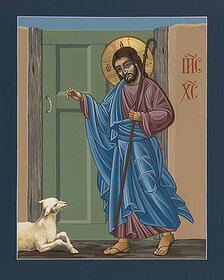 Many years ago when I was in Religious life there was a small plaque in the foyer of the house where I lived which read “When a Guest Enters, Christ Enters.” Later I learned that it was a rephrasing of an important characteristic of the Rule of St. Benedict regarding hospitality: “Let everyone that comes be received as Christ.” (Chapter 53:1).* In the years since, I have thought that this should be a characteristic that marks every Christian home. This attitude of welcome should be evident in our behavior outside of our homes, too; any stranger we greet ought to be welcomed as if that person was Christ. The Gospel message of Jesus, both in His words and deeds, makes it clear that our love is what will mark us as one of His followers. To love is to welcome: the gospels are replete with passages in which Jesus taught what it means to love, and He never turned anyone away who sought Him for any reason, giving special care to those who were ‘out-casted’ by society. Therefore, in the light of what Jesus taught, it is important to reflect upon the nature of our welcome to Him, especially when He arrives in one of His more “distressing disguises,” as St. Mother Teresa of Kolkata used to say.  Our lives consist of a series of potentially welcoming events. As newborns we were meant to be welcomed into the loving arms of our parents with great joy and fanfare. This is not always the case for many in the world, however, and so it is even more important for us to be welcoming to those who do not know the joy of being accepted and embraced. For one who is broken, to be sincerely welcomed is often the beginning of healing, even if in the smallest way. This is what Jesus did when He welcomed the Samaritan woman at Jacob’s Well, or when He engaged with Zacchaeus and then with Levi (Matthew), as well as numerous lepers, blind or infirm people He healed, sinners at whose tables He sat, and even the demoniacs who were truly desperate cases. Not only that, but when Jesus was the guest He brought a welcoming attitude, a profound openness to those He encountered. Every person, worst sinner or greatest saint, has always been welcomed into His heart if they sought entrance, and He even welcomed those who did not! The door to the heart of Jesus is never closed.  In the Old Testament the call to welcome the stranger appears numerous times in the Law as well as in the Prophets. It was clearly an essential virtue in the Jewish faith. An example is found in the Book of Jonah in which God tells Jonah to go to the ‘enemy’ city of Nineveh to preach. Jonah agreed, but then sailed in the opposite direction. He ended up being swallowed by a large fish, in its stomach for three days and nights, (symbolic of being in the darkness of despair), and through God’s mercy, being saved. This time Jonah went to Nineveh straight away; to his shock everyone from least to greatest not only welcomed him, but also took God’s message to heart and repented. Jonah became indignant at this, needing to learn yet another lesson about mercy which then God provided. The meaning behind this ‘long parable’ ** was actually a message for all the Jewish people of his day: If you are not welcoming to those ‘other’ than you are, even your enemy, how do you expect them to want to come to God? That is, unless we welcome the stranger, the ‘other-than-we-are,’ into the entirety of God’s message, (which means to love them), we cannot expect them to listen, or consequently to believe and thus know the saving power of God’s love.  We are God’s ambassadors, the ones who extend His love and mercy to others, though unfortunately we are also capable of withholding it. Therefore, it is important that we reflect upon the kind of hospitality and welcome we offer not only to guests who enter our homes, but to guests who enter our lives through everyday encounters. As disciples we are called to respond courteously when we are unintentionally (and even intentionally) wronged, to offer Christian love to the poor, marginalized, ill, disabled, those who adhere to different religious or political views, or who are new to our neighborhoods, churches, schools, or civic organizations. Do we receive them as if we are receiving Christ? We must remember that whether we meet a friend or a stranger, Jesus might be ‘hidden’ within layers of hurt, brokenness, and poverty (materially or spiritually) with which their heart may be overburdened. If we respond to Jesus with loving hospitality, the person may begin to see His presence within them, and therefore accept the new life He brings. Our welcome to such a brother or sister brings them back into being seen, heard, and accepted into the life of the Church, a community of believers, filled with hospitality and love.  Jesus is not a demanding guest, but rather, He gives, offering whatever it is we need. As our welcome becomes one with His, we will become living residences to which people will come for shelter. Thus, we will be building up the Kingdom of God. Jesus said, "Whoever receives one child such as this in my name receives me.” (Matthew 18:5) Therefore, it is in welcoming a ‘child of God’ that we are welcoming a guest, and when a guest enters, Christ enters.  May we learn to receive Jesus the Guest, especially when He comes to us in a ‘distressing disguise!’ May we become as a shelter for those who are lost, confused, or in need of a friend! And may we offer others a welcoming heart filled with kindness, mercy, and love, revealing our God who desires to welcome all into His Kingdom! Let us continue to meet in the Heart of Jesus! Peace! ©Michele L. Catanese Notes: * The quote is from the Rule of St. Benedict chapter 53:1, as noted. To be clear, my religious community was not Benedictine, but hospitality was part of our charism. ** The Book of Jonah is included in the books of the Minor Prophets in the Old Testament. It is indeed prophecy, but the author was anonymous, sharing God’s message through a story: here, the writer (a prophet) purposely set Nineveh in a time-period and place that were erroneous in order to make sure the reader recognized this. Thus, this book was written in the form of a story (having an embedded meaning like a parable) in which Jonah is a character and not a real person. Storytelling was very much part of the Jewish culture and these stories always bore a message which the hearer was to glean. Jesus was a master of storytelling in this form, though His parables were shorter, always about the Kingdom of God. Images: 1. Painting, The Visitation by Bl. Fra Angelico. This is the quintessential welcoming of Christ: Elizabeth literally welcomes Christ within Mary. 2. My photo of an icon, The Samaritan Woman at the Well. This photo was taken at the church that houses Jacob's Well today, in the very place where Jesus encountered the Samaritan woman. It is in Jericho, Palestine. 3. Painting, Jonah in the Fish, by Luisito Magno. 4. My photo, flowers in window boxes in Lugano, Switzerland. 5. My photo of a man with his young son taken in Portree, Isle of Skye, Inner Hebrides, Scotland. 6. Icon, El Buen Pastor, by Fr. William Hart McNichols. Jesus the Good Shepherd knocks on the door of our heart. Let us welcome Him in! You can find this at https://fineartamerica.com/featured/el-buen-pastor-188-william-hart-mcnichols. Note: In compliance with GDPR rules, I wish to make it clear that I do not gather any information on any of my readers at any time.
Evelyn Cambria
6/28/2021 11:17:02 pm
What a wonderful read Michele! You should be writing for Magnificat! This was beautifully done. Thank you for sharing your knowledge, gifts, and talent, Comments are closed.
|
Heart Speaks to Heart
|

 RSS Feed
RSS Feed

